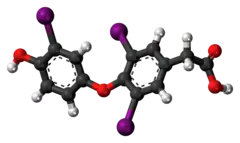Tiratricol
Tiratricol (also known as TRIAC or triiodothyroacetic acid) is a thyroid hormone analogue. Triiodothyroacetic acid is also a physiologic thyroid hormone that is present in the normal organism in low concentrations.
 | |
 | |
| Clinical data | |
|---|---|
| Other names | 3,3',5-triiodothyroacetic acid TRIAC |
| AHFS/Drugs.com | International Drug Names |
| ATC code | |
| Pharmacokinetic data | |
| Protein binding | Presumed high |
| Metabolism | Hepatic glucuronidation |
| Excretion | Biliary |
| Identifiers | |
IUPAC name
| |
| CAS Number | |
| PubChem CID | |
| IUPHAR/BPS | |
| DrugBank | |
| ChemSpider | |
| UNII | |
| KEGG | |
| ChEMBL | |
| CompTox Dashboard (EPA) | |
| ECHA InfoCard | 100.000.079 |
| Chemical and physical data | |
| Formula | C14H9I3O4 |
| Molar mass | 621.935 g·mol−1 |
| 3D model (JSmol) | |
SMILES
| |
InChI
| |
| | |
Uses
It is indicated in the management of thyroid hormone resistance syndrome[1] and is used, in combination with levothyroxine, to suppress thyroid-stimulating hormone production in patients with thyroid cancer.
It has been investigated for use in reducing goiter.[2]
It has also shown some effectiveness in reducing the atrophy caused when using corticosteroids.[3]
Tiratricol has also been widely marketed, under various trade names, as a weight loss aid. In 1999 and 2000, the United States Food and Drug Administration and Health Canada both issued warnings to the public regarding the use of dietary supplements containing tiratricol.[4][5]
Legal status
Tiratricol is not approved for sale in Canada or the United States. It was once an approved drug in Brazil, but its marketing authorization was suspended in 2003, effectively prohibiting its sale.[6] Tiratricol is still available in France for therapy of thyroid hormone resistance and adjuvant therapy of thyroid cancer.[7] It is available as an orphan drug to be prescribed by registered specialists in Europe.
References
- Carvalho GA, Ramos HE (2004). "[Thyroid hormone resistance syndrome]". Arq Bras Endocrinol Metabol (in Portuguese). 48 (1): 83–92. doi:10.1590/S0004-27302004000100010. PMID 15611821. "Free full text" (PDF). (95.3 KiB)
- Brenta G, Schnitman M, Fretes O, et al. (November 2003). "Comparative efficacy and side effects of the treatment of euthyroid goiter with levo-thyroxine or triiodothyroacetic acid". J. Clin. Endocrinol. Metab. 88 (11): 5287–92. doi:10.1210/jc.2003-030095. PMID 14602763.
- Yazdanparast P, Carlsson B, Oikarinen A, Risteli J, Lavin T, Faergemann J (November 2006). "Action of topical thyroid hormone analogue, triiodothyroacetic acid in reversing glucocorticoid-induced skin atrophy in humans". Thyroid. 16 (11): 1157–62. doi:10.1089/thy.2006.16.1157. PMID 17123343.
- "FDA Warns Against Consuming Dietary Supplements Containing Tiratricol" (Press release). U.S. Food and Drug Administration. November 21, 2000. Retrieved 2007-08-08.
- "Health Canada issues warning on products containing Tiratricol (TRIAC)" (Press release). Health Canada. December 2, 1999. Retrieved 2007-08-08.
- "Anvisa suspende Tiratricol" (in Portuguese). Brazilian Society of Endocrinology and Metabolism. Archived from the original on 2007-10-09. Retrieved 2007-08-08.
- Laboratoires DB PHARMA: Teatrois information